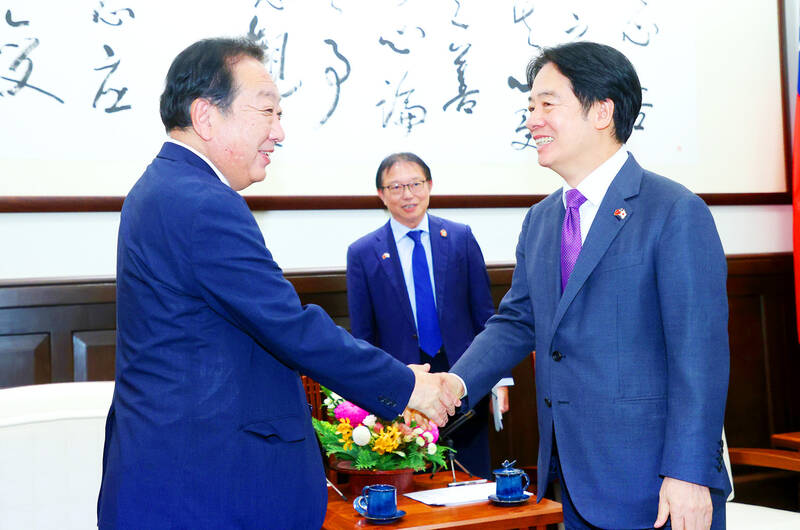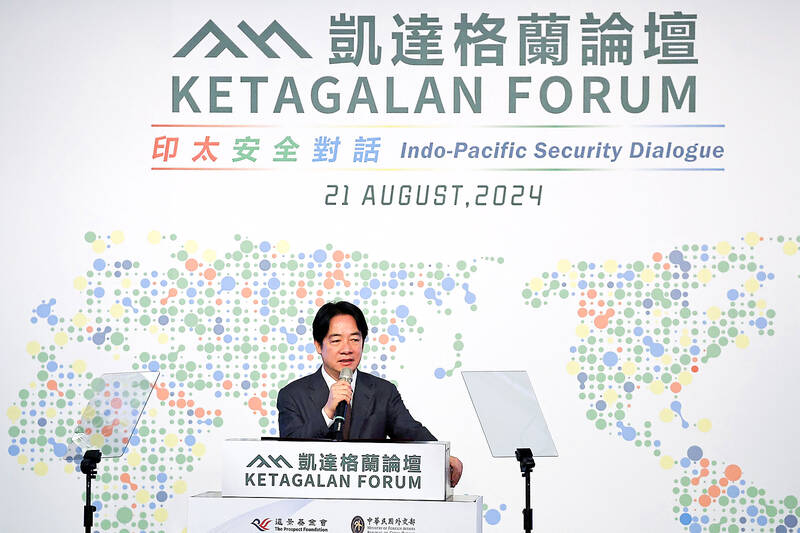China’s authoritarian expansionism would not stop with Taiwan, President William Lai (賴清德) said yesterday, calling for solidarity among the world’s democracies to check Beijing’s territorial ambitions.
Taiwan is determined to become a decisive force for democracy, peace and prosperity, standing side-by-side with its democratic partners to confront authoritarian expansionism and protect shared values, he told the annual Ketagalan Forum on Indo-Pacific security in Taipei.
Authoritarianism is now a global challenge, Lai said, using as examples Chinese military expansionism, economic coercion and the use of hybrid warfare tactics such as cyberattacks and cognitive warfare.

President William Lai, right, shakes hands with former Japanese prime minister Yoshihiko Noda at the Presidential Office in Taipei yesterday.
Photo: CNA
“We are all fully aware that China’s growing authoritarianism will not stop with Taiwan, nor is Taiwan the only target of China’s economic pressures,” he said. “China intends to change the rules-based international order. That is why democratic countries must come together and take concrete action.”
Taiwan “will not be intimidated” in confronting the security threat posed by China and upholding its responsibility to regional peace and stability as part of the first island chain, Lai said.
Detailing his four-pillar plan for peace — a policy he discussed while campaigning to be president — Lai said the administration’s first order of business is to bolster Taiwan’s defensive capabilities.

Taiwan`s President Lai Ching-te makes a speech at the annual Ketagalan Forum in Taipei, Taiwan August 21, 2024.
Photo: Reuters
Military spending is being increased to ensure Taiwan is more self-reliant regarding national defense, Lai said, adding that the policy is based on domestic production, foreign arms procurement and the creation of a technology transfer mechanism for emerging technologies.
Taiwan must also increase economic security by diversifying investments to spread trade risks and reduce its dependency on China, Lai said.
China accounted for 11.4 percent of Taiwan’s foreign investments last year and 31.2 percent of the nation’s trade volume in the first quarter, compared with 83.8 percent and 43 percent in 2010 respectively, he said.
The government is pursuing trade agreements with nations such as Australia, Canada, Japan, Lithuania, South Korea and the US to increase economic resilience, Lai said.
Taiwan has entered second-phase negotiations with Washington on the US-Taiwan 21st Century Trade Initiative and recently signed a deal with Ottawa, he said.
His administration plans to deepen its partnerships with other democracies and the forum is a part of that effort, he said.
Those attending this year’s forum are to deliberate Taiwan’s role in the push to stabilize global supply chains, he said, adding that the government is working with other nations to create “democracy chips.”
Taiwan would enhance cooperation with other democracies to deter aggression from China, prevent the rise of conflicts in the region and “achieve our goal of peace through strength,” Lai said.
As a responsible member of the international community intent on maintaining the “status quo” in the Taiwan Strait, the nation would not shy away from conducting talks with Beijing under the conditions of equality and dignity, he said.
Former Japanese prime minister Yoshihiko Noda told the forum that Taiwan and Japan have signed more than 60 cooperative agreements, including a bilateral investment agreement and a commitment to realizing the Treaty on Open Skies.
Japan would back Taiwan’s bid to join the Comprehensive and Progressive Agreement for Trans-Pacific Partnership as the two sides share the universal values of freedom, democracy, human rights and rule of law, he said.
Taiwan’s exclusion from the WHO undermines the global effort to protect health, and he supports the meaningful participation of Taiwan in the World Health Assembly, the WHO’s decisionmaking body, Noda said.
Citing comments by heads of state calling for peace and stability in the Taiwan Strait, he said that the international community has reached a consensus on Taiwan’s importance to the rules-based global order.
Japan, with its close ties to Taiwan, should lead the effort to inform the world about its significance, Noda said, adding that he is in “staunch opposition to any unilateral attempt to change the status quo by force or coercion.”
Disputes between Taiwan and China must be resolved peacefully, he said.
Source: Taipei Times - 2024/08/22




















